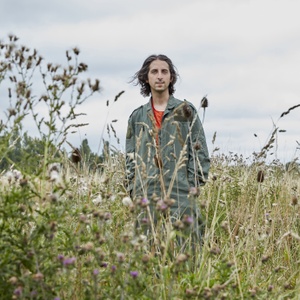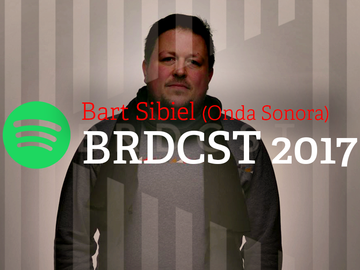Finding radically innovative sounds without losing sight of the roots of music and slaking your thirst on even more global sounds, spiritual jazz, and even cosmic noises in a world that grows ever-smaller. The things that drive British producer James Holden are all the things that the BRDCST festival holds dear, so it is giving him a prominent place on this year’s programme.
© Laura Lewis
| James Holden
On The Animal Spirits, which was released last autumn, James Holden explores the intersection of organic and electronic sounds, searching for the roots of the trance that has enraptured him his whole life. At first glance, it looks like not much is left of the DJ/producer, who made his breakthrough in 2004 with a remix of Nathan Fake’s “The Sky Was Pink”. “It is true that I am no longer a DJ,” the 38-year-old Brit says when we phone him at his studio in a suburb of London. But the transition from repetitive dance floor beats to the hypnotizing psychedelic ambient on The Animal Spirits came more naturally than the career switch might lead you to suspect. An intense encounter with a number of traditional Moroccan musicians led him to change direction.
“For me personally it was both a way to connect with the culture of my Greek grandmother, who was born in Turkey near the Syrian border, and to connect with the way the world is today. The fact that people from North Africa and the Middle East are being pressured to move is the root of the current unrest in Europe. I know it is not enough just to reassure everyone, but hand on heart: my Greek-Turkish grandmother is fundamentally no different from my English grandmother. I find it really heart-warming that a festival like BRDCST highlights all the similarities between the so-called differences in music and in the world.”
In Morocco, I saw somebody going into a trance. That was my first confrontation with the hypnotic power of music

Is it a coincidence that almost all the themes championed by BRDCST are also on your new album, or did you simply aim to capture the zeitgeist on The Animal Spirits?
James Holden: Probably both. We live in an era in which it is important to reach out to the rest of the world and to bring that world to Europe. The starting point for the album was all the things we have in common as people. We all react the same way to basic stimuli. In essence, the electronic trance music I loved as a teenager is not so very different from mystical Moroccan or Asian religious music.
You swapped straightforward dance music for a more organic and instinctive approach. Was that a leap out of hedonistic culture into spiritual enlightenment?
Holden: Of course there is spirituality in The Animal Spirits, but my music is primarily intended for me to get closer to myself. Dance music is folk too. Especially now that the genre has a certain age. I never wanted to make anything that somebody else could easily pigeonhole. That’s not in my nature. As far as I’m concerned, you could remove the straight kick drum – which is one of the basic ingredients of house – from a house record and yet its house spirit would still be intact. At a certain point I became interested in removing the labels that we attach to genres. When you try to play house with a live band, it quickly starts sounding like jazz. If you make repetitive jazz, you have the basic foundation of a techno album.
You know, during my childhood, there was only classical music in our house, until I discovered the counterculture thanks to my hip physics teacher, who was a fervent clubber and raver. The electronic music he gave me was incredibly exciting, but its basics were not so very different from the three chords that I would play for half an hour at a time, often in a loop, on the classical piano. I have always been fascinated by repetitive patterns. When I used to listen to my favourite Judas Priest album, I would focus on a good riff that was repeated time after time. The quest for whatever caused that hypnotic feeling was the most important motivation to try it myself as a DJ and producer.
In Morocco, you played music with the Gnawa masters. Why was that a turning point?
Holden: Because that was where I was first confronted with the hypnotic power of music. I had read a lot about how our brain reacts to music and the way religions deal with that therapeutic effect. But that was the first time I actually saw somebody go into a trance. A Moroccan woman who worked at the place where we were rehearsing happened to come in during a session of my colleague Vessel and a Gnawa master, but the repetitive, piercing tones of his percussion instrument made her lose consciousness almost immediately, and they had to carry her back out. This wasn’t just mumbo jumbo, sorcery, superstition, or some trick. The fact that her brain had become fixed on the frequency of the rhythm and that led her into a trance is completely consonant with the scientific literature.
Do you meditate?
Holden: Yes, but after a good morning meditation, I still have the same kind of feeling as after listening to a Terry Riley record. [Laughs]
Is it true that your first session with the Moroccan musicians didn’t go as expected?
Holden: Yes, to my great shame. Their percussion instruments were so much more musical than my expensive box of high-tech tricks. Electronic instruments are designed to predominate musically. It had to succumb because as long as my sequencer did not listen to the musicians, we would be stuck on different wavelengths. Fortunately, I was able to repatch my modular synth to a machine on which I could really perform. After that we were fine. “Bania”, one of the tracks we recorded then, is still one of my favourites. Sitting on the floor, face to face with master Mahmoud Guinia and his band, we really felt one another through the music. He may have been of a different generation and from a different continent, and I could barely understand anything he said, but nevertheless, we managed to achieve total synchronicity. That’s what I am trying to recreate now with my live band The Animal Spirits.
We live in an era in which it is important to reach out to the rest of the world and to bring that world to Europe.
Where is the impressive tree from the album cover, and why is it covered in colourful ribbons?
Holden: The tree is in a wood in Norwich. I love trees. They have deep roots and capture time. Their shape alone tells their whole life story. The ribbons were an idea from an acquaintance whose sister has Williams Syndrome. Patients with this congenital cognitive disorder enjoy listening to music and love repetitive patterns. When the girl in question doesn’t tie her hair back in a ponytail, she swishes it in front of her face all the time, mesmerized by the same movement that it makes repeatedly. She also loves ribbons. There is that trance again…
Do you feel as though audiences are more receptive to your self-proclaimed “synth-led folk-trance standards”?
Holden: Yes. Other cross-cultural collaborations and the internet have fuelled that interest, I think. I am very much looking forward to the new album by Sons of Kemet, which blends jazz with electronica and political statements. The fact that musicians like Ed Sheeran get a lot of streams on Spotify can’t stop the counterculture anymore.
You made the new album in the midst of the Brexit commotion. Many of your compatriots don’t seem to have embraced the same values that you champion.
Holden: I am mortified. It is terrifying. Their choice might lead to the fact that only commercial deejays and the Ed Sheerans of the world get to enjoy freedom of movement, which is one of the most important achievements of post-war Europe. I am not looking forward to having to submit work permit applications for seven musicians to come and play in Europe. Are we really going to reintroduce all those bureaucratic barriers? In our sector, underground culture will suffer especially. By that I mean the musicians who do not earn a lot of money and who don’t do it for the money. Perhaps we had become too complacent, but nevertheless, I think protesting against Brexit is still worth fighting for.
So are you not preaching to the choir?
Holden: That is partly true, yes. But make no mistake. On Instagram, I follow a lot of musical equipment freaks, and there was a picture of a synthesizer with the sticker “This synth kills fascists” [a reference to the iconic “This machine kills fascists” message on the guitar of the folk pioneer Woody Guthrie − TP]. This picture received a series of angry reactions like: “Woody Guthrie was a socialist and they are terrible too.” So I’m not only preaching to the choir…
On the other hand, there are other places than the stage to voice my concerns. When I am out walking the dog, I can also enter into a respectful dialogue with an older man or woman on park bench and try to change their mind. That might even get me closer to the root than as an artist on a pedestal.
> BRDCST: JAMES HOLDEN & THE ANIMAL SPIRITS. 8/4, 17.00, Ancienne Belgique
Read more about: Muziek

Fijn dat je wil reageren. Wie reageert, gaat akkoord met onze huisregels. Hoe reageren via Disqus? Een woordje uitleg.